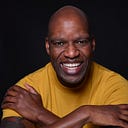Member-only story
The Burden of Being the Only Black Guy at Work
Does the comfort of my White colleagues matter more than my own? (That’s a rhetorical question!)
For the most part, I’m pretty good at doing me. But If I were to step outside my body and watch myself in situations where I’m the only Black guy in the room, particularly at work, I’d see me doing a me that’s not quite me.
Though I don’t use African American Vernacular English (AAVE) in my everyday life, I constantly code switch around White people when I’m on the clock. I adjust my behavior. I soften my edges. I like to think of myself as being a fairly congenial person, but I’m passionate and opinionated — and I can be loud, too. When you’re passionate, opinionated, loud, and Black in a room full of White people, it can be unsettling to them.
I don’t want to be seen as the scary Black man — the one that has haunted White people’s nightmares since the days when a Negro uprising was a Southern slaveowners biggest fear, which made the latter even more brutal. It’s the reason why so many unarmed…
